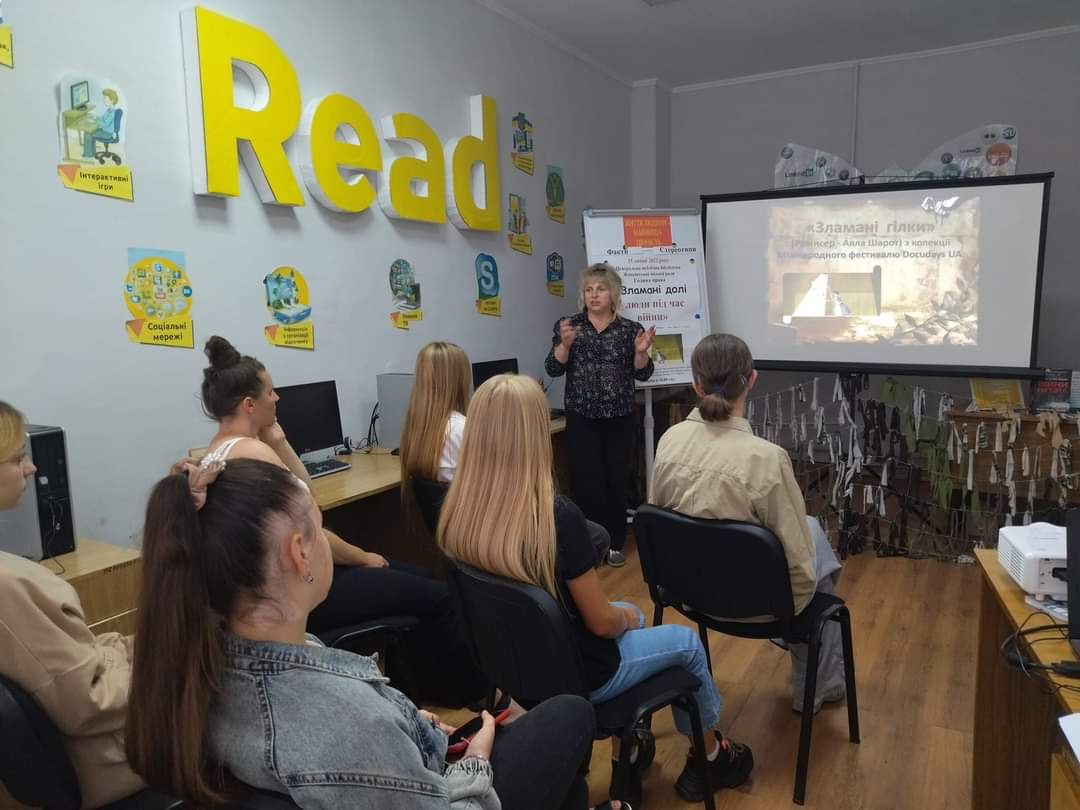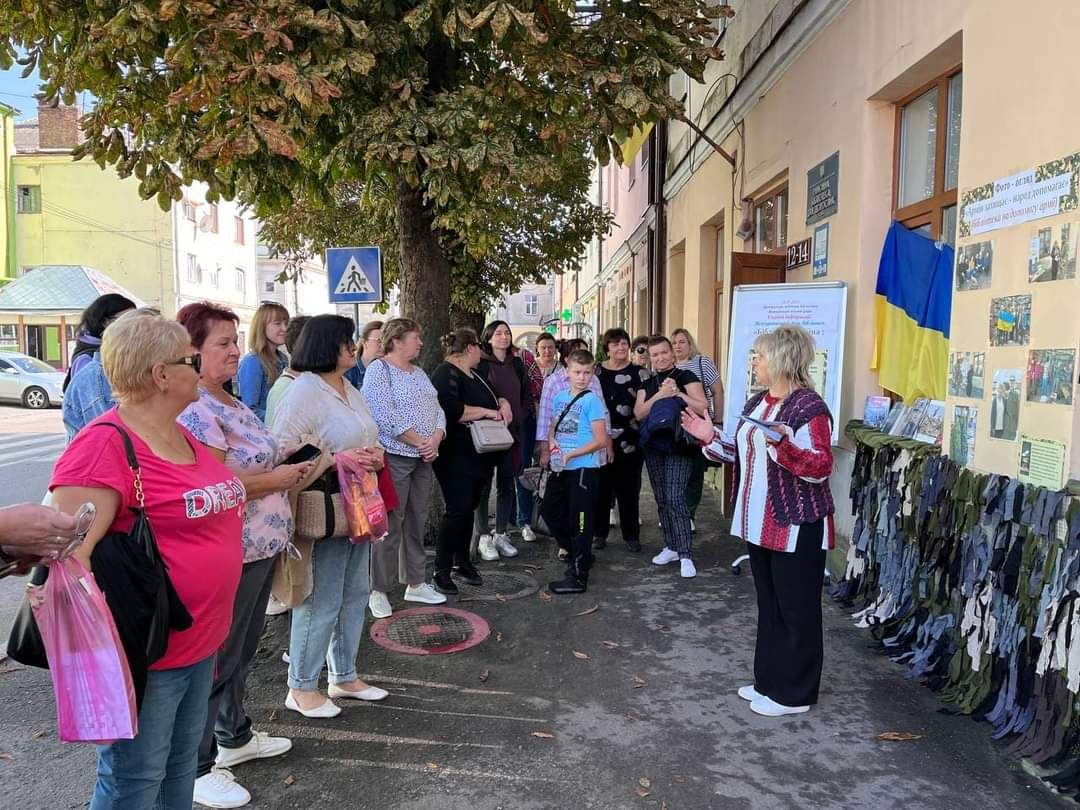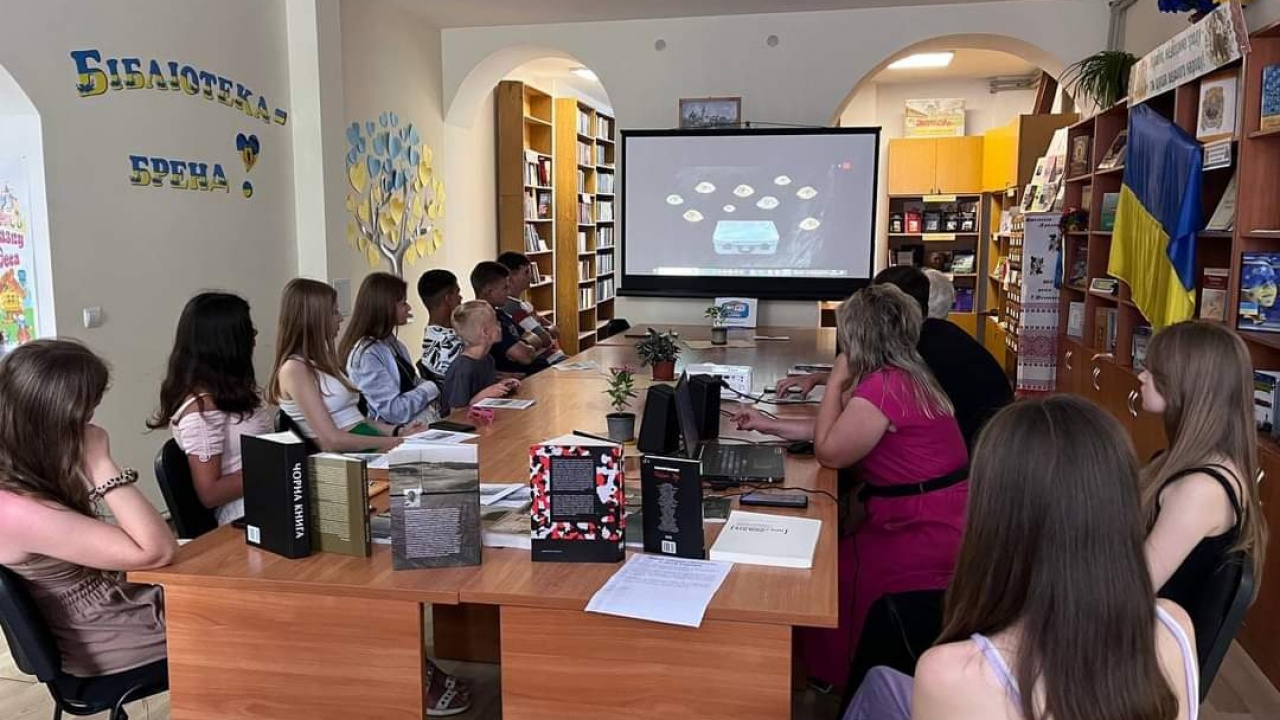8 years ago, Sofia opened at the library a Docudays UA documentary film club, which is part of the DOCU/CLUB Network, and became its moderator. Since then, the library has become a center of legal education in the community. Why are the residents of Zhovkva and surrounding villages interested in documentary films? How does the film club change people's lives and the community itself? Sofia Kikh shares her story and achievements. “I have always seen myself in the field of legal education and even considered studying law. I always wanted to help people. When in 2016, the DOCU/CLUB Network together with the ‘Bibliomist’ program announced a competition for opening of Docudays UA film clubs in libraries, I took part in it. I designed a project, and our library won. I've been working on it ever since,” says Sofia. Of course, at first, there was a lack of knowledge and experience, and Sofia had to learn a lot. But the film club started gathering viewers for documentary screenings, engaging experts in discussions, raising issues that are important to people, and educating them about protection of their rights. The moderator explains: “I think that cinema is the best tool which allows you to reach out to any person and helps people look at themselves from the side. Our film collection includes the movie ‘Bully’ by American director Lee Hirsch. It tells the story of a boy who is bullied at school. This is an urgent problem for our children as well. I have screened this film many times, holding separate screenings for teachers, parents, and schoolchildren. This is a way for teachers to see how they can influence the situation at school, and for students to understand how bullied children feel and how to protect themselves in such situations. As for parents, after watching the film, they start talking with their children at home and asking them more about school life. Thus, the problem of bullying is no longer silenced, which means it can be resolved.” Film screening in the library The film club has long spread beyond the library. The moderator believes that her task is to reach out to the entire community, because the film club not only introduces viewers to the best films that have won international festivals, but also teaches them how to solve problems that are important to people. “I work as a bibliographer and methodologist, meaning that I am responsible for community outreach in the library. Our community comprises seventeen villages, and I have 'my' people in each of them – they are my colleagues, librarians. Thanks to them, I know what problems people are concerned about and what film I need to offer them. That's how I travel with my film club,” says Sofia Kikh. “In addition, I have my own ‘trick’ that helps me work effectively. As a bibliographer, I have long ago collected a database of all governmental and non-governmental organizations in our community, and we actively cooperate with them. For each film screening, I develop legal educational booklets. They contain topics for discussion and background information. I also create suggested reading lists for each topic, and I always add contacts of organizations that can be contacted for help. After the screenings, people take the booklets with them and keep this information at home in a hard copy, which allows them to consult with it at any time.” Meeting with locals and IDPs Sofia says that adults, youths, and children are all interested in watching and discussing documentaries. After the start of the full-scale invasion, she focuses specifically on the internally displaced people: “The border with Poland is only 30 kilometers away, so a lot of people have come to our city and our community in search of refuge from the war. Officially, they are called IDPs, but I don't like this word. These are our fellow citizens who need to integrate into a new community, find work and friends.” The cinema club has become an emotional refuge for people who were forced to leave their homes, a place where they receive help. “I don't hold separate screenings for IDPs. These people have become residents of our city, they are our good friends,” says the moderator. “They often do not understand where to turn for legal aid. Perhaps these people did not have such a need before the war. I am sorry that they did not have the opportunity to attend the film clubs of our Network before the war, because our viewers are better informed about protecting their rights. But I'm happy that the IDPs come to the screenings, join the discussions, and are no longer afraid to seek help through me. I give them all the necessary contacts. People see that they are not alone in this world, and it becomes a little easier for them. We have already helped many people in this way.” This feeling of support and mutual assistance has a healing effect on people, gives them strength, and encourages them to change life in their city. The film club supports them and teaches them how to influence and interact with the authorities. Sofia Kikh tells how she implemented an advocacy campaign in Zhovkva to help stray animals: “It was a major problem for our community. Volunteers tried to solve it, knocking on various doors, but it was not effective. When the DOCU/CLUB Network announced the DOCU ACTS competition for advocacy projects, I decided to use this chance to help animals. The idea was to open a temporary shelter for animals and then place them in families.” Street rally during the advocacy campaign The activists managed to interest authorities and encourage them to participate in the project. They held screenings and discussions of documentaries, invited representatives of the authorities and the community, and organized street demonstrations in support of animals. In a short time, Sofia Kikh and like-minded people won over the community residents and convinced the authorities of the necessity of their project. Sofia recalls that the residents of Zhovkva were so imbued with the idea that they started bringing animals to the library to save them. Pandemic and war slowed down the planned construction of a large shelter in Zhovkva, but did not stop the campaign's initiators. “This project has brought people together. And we got the result: on the basis of the advocacy campaign, the NGO ‘Happy Tails in Zhovkva’ was created in our city. Some people have created small temporary shelters for animals, which the NGO then adopts into families. And the local authorities help the shelters with funds on a regular basis. We managed to get the mayor, local deputies, and community members to support our idea,” the film club moderator shares her results. The full-scale war has only increased the viewers’ urge to gather at the film club, watch films together, and communicate with each other. Sofia Kikh's son serves in the Ukrainian Armed Forces. As a mother who is waiting for him to return home, the film club moderator knows well how much support is needed for families whose relatives are defending the country from the aggressor. “People now perceive our films differently. I would say that any film is viewed through the prism of the experience we are currently living through ourselves. Recently, I invited women to a screening of ‘Silent War’ by French director Manon Loizeau. It tells the story of Syrian women who witnessed crimes against humanity. My viewers recognize themselves in the film's characters. We discussed the film with them, and this made us stronger and closer to each other,” says the moderator. Sofia Kikh notes that Russian aggression, with its violation of all international legal norms, is transforming people's attitudes towards human rights protection: “We realize that respect for human rights is what distinguishes us from our enemies. People want to know their rights and understand the principles and methods of their protection. CItizens are increasingly realizing that violations of their rights should not be silenced, that they should speak up and learn to defend them. This is important for our future.” Sofia Kikh's experience proves that a concerned and active person can turn a public library into a powerful platform for legal education, making it a place for community members to meet and communicate. “I have always been a driver of interesting ideas,” admits the film club moderator. “I see the powerful effect of documentary films on people. That's why my film club has become my lifetime occupation.” Written by: Olga Gurgu Photos from Sofia Kikh’s archive The development of the DOCU/CLUB Network is funded by the United States Agency for International Development (USAID), the Embassy of Sweden in Ukraine, the National Endowment for Democracy (NED) and Fondation de France. The opinions, conclusions, or recommendations are those of the authors and compilers of this publication and do not necessarily reflect the views of the governments or charitable organizations of these countries. The authors and compilers are solely responsible for the content of this publication.


“PEOPLE SEE THEY ARE NOT ALONE IN THIS WORLD”: HOW A DOCUMENTARY FILM CLUB IN ZHOVKVA UNITED THE COMMUNITY
15 July 2024
For 11 years now, Sofia Kikh has been working as a bibliographer at the Central Public Library in Zhovkva, Lviv region.
